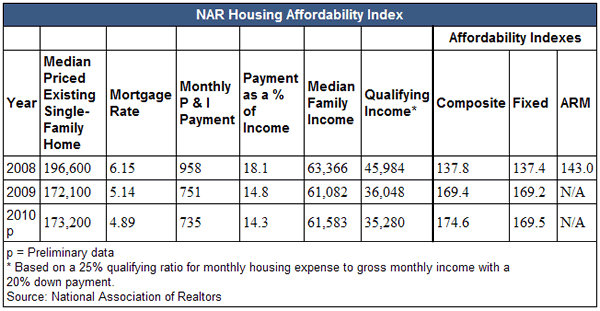Despite an ever-improving economy and an optimism surrounding the stock markets, the housing sector remains in a deep funk. The foreclosure crisis continues to take its time getting untangled -- based on the alarming levels of foreclosure activity in 2009 and 2010, the glut of unsold homes may take several more years to whittle down.
Distressing as this may seem, several other factors have recently come into play, and they are likely to affect the housing sector in coming quarters and years, pushing the foreclosure factor into the background. And once again, Fannie Mae and Freddie Mac are at the center of attention as investors debate where interest rates and, subsequently, home mortgage rates will go from here.
Fannie, Freddie, and the Fed
In recent weeks, the Obama administration joined forces with those in Congress who believe mortgage lenders Fannie Mae (The Federal National Mortgage Association) and Freddie Mac (The Federal Home Loan Mortgage Corporation) are part of the problem, not part of the solution. Both of these government-sponsored enterprises (GSEs) provided hundreds of billions of dollars in low-interest loan guarantees, and most believe they helped to create the environment that led to the unsustainable housing boom.
As an increasing number of bipartisan legislators look to sharply shrink both Fannie Mae and Freddie Mac, we could be moving toward a deep change in the housing market. Currently, Fannie Mae and Freddie Mac serve an important purpose: providing local banks with federal funds that are then lent to homeowners. If these organizations shrink -- or are eliminated completely, as some policy makers hope -- lenders will have only limited access to federal funds. And if banks are forced to use more of their own capital to lend, they'll demand higher interest rates to compensate for their own increased risk.
Higher interest rates = fewer buyers. And fewer buyers means housing prices may fall further. Here’s why.
Let’s say a young couple wants to buy a $200,000 home with a 10% down payment. To finance the $180,000 at current interest rates of about 5%, they’d be looking at a $966 monthly principal and interest payment (before taxes and insurance).
But if rates rose to 8%, as they very well could, the monthly payment would rise to $1,320. And someone trying to buy a $400,000 home would pay $800 more per month if rates rose from 5% to 8%.
[If you're ready to buy a home, use our Mortgage Calculator to see what your monthly principal and interest payment will be.]
End Of An Era?
One of the silver linings of the recent economic crisis was that slumping housing prices made them far more affordable. According to the National Association of Realtors (NAR), the housing affordability index rose from 137.8 in 2008 to 174.6 in 2010. (A value of 100 means that a family with the median national income has exactly enough income to qualify for a mortgage on a median-priced home. An index above 100 signifies that a family earning the median income has more than enough income to qualify for a mortgage loan on a median-priced home, assuming a 20% down payment.) Falling home prices helped, but so did falling interest rates, which are now starting to trend higher. By my math, an interest rate increase to 8% would wipe out all of the gains the NAR index posted in the last few years.

Why am I fixated on 8%? It’s not just the Fannie and Freddie factor. Their withdrawal from the market would push mortgage rates to the 7% mark, but the rest of the push would come from an expected improvement in the economy that would push up interest rates across the board, perhaps by 100 to 200 basis points over the next few years (i.e., a 1% to 2% interest rate increase).
Generally speaking, stronger economic activity leads to expectations of higher prices. The Federal Reserve, which has a key role in setting interest rates, tends to raise rates when an economy strengthens. It’s important to note that mortgage rates track the rates on 10-year Treasury Bills, and those longer-term rates are dictated by the bond market and not the Fed. Nevertheless, when the Fed raises short-term rates, it still exerts a strong indirect influence on the direction of mortgage rates.
What It Means To Home Buyers
The implications are clear for potential home buyers. If you plan to purchase a home and will need to borrow heavily, this is likely a great time to lock in a loan, especially while home prices remain low. If you are unable to afford a down payment right now, there’s no need to panic. Instead, focus on continuing to build up a down payment, and think about looking for a more modest home than you originally envisioned. To add yet another hurdle, lenders are now asking for increased down payments of up to 20% or 30% -- a big change from the days of 5% down. That means potential homebuyers will need more time to build up savings before taking the plunge.
But if you’ve got plenty of cash sitting in the stock market or elsewhere, you should be in no hurry because as loans become harder to obtain, the tables shift in favor of those who can pay cash. You’ll have less competition for the home you’re looking to buy, and if higher rates indeed choke off demand, you may be looking at further price slumps for housing in the future.
If you already own a home and you’ve rushed to pay off your mortgage, you may want to leverage up once again, as borrowing rates remain very low by historical standards. The cash you receive in the refinance may earn a higher return in a passively managed index fund or high-dividend paying stock than it would earn in housing. If inflation again rears its ugly head, as some expect it will over the next few years, a lock on a 5.5% mortgage looks better and better as inflation runs higher and higher.
The housing sector is impacted by so many variables that it’s impossible to know precisely how interest rates, home prices and demand will play out over the next few years. But the actions of Fannie Mae, Freddie Mac and the Federal Reserve certainly bear watching over the coming months.
[Learn more in the InvestingAnswers feature: How to Protect Yourself From Rising Mortgage Rates.]



